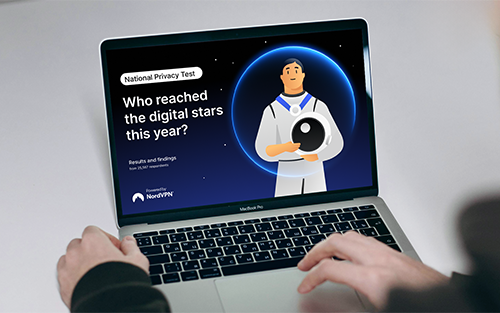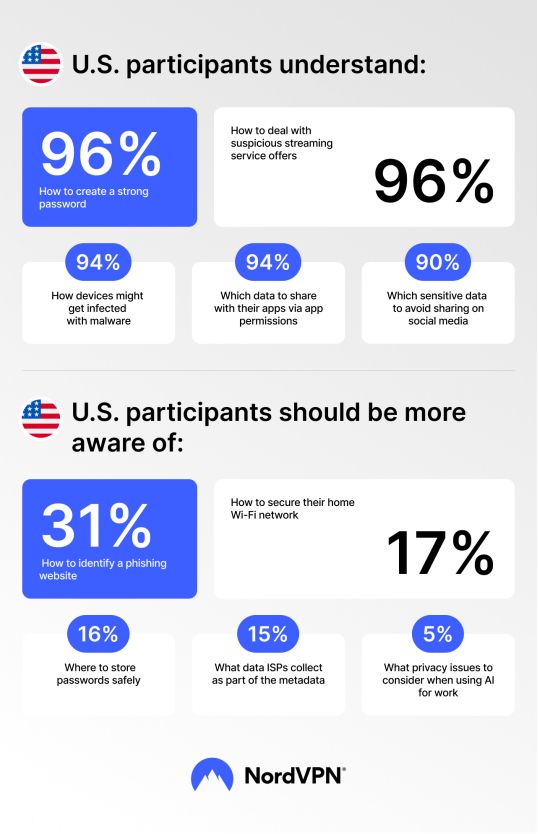- September 16, 2025
- News
Summary
The study shows that the US cybersecurity and online privacy awareness hasn’t improved since last year, according to NordVPN.

Sept. 16, 2025 – Americans rank 4th globally in cybersecurity and online privacy knowledge, according to the new research by the cybersecurity company NordVPN. Americans excel at dealing with suspicious streaming service offers (96%) and creating strong passwords (96%), but only 5% of them can identify the privacy issues of using AI at work.
The annual National Privacy Test (NPT) is a global, open-access survey designed to evaluate people’s cybersecurity and online privacy awareness and to educate the public about cyber threats and the importance of data and information security. The 2025 edition analyzed 30,792 responses across 186 countries.
“AI has raised the stakes online, but the fundamentals of staying safe haven’t changed. People are getting better at spotting scams, yet too many still skip updates or reuse passwords, and those small gaps are exactly what criminals exploit. The test aims to educate people worldwide about cyber threats and offer clear, practical guidance to reduce the risks of fraud, data harvesting, surveillance, and other online threats,” says Marijus Briedis, chief technology officer (CTO) at NordVPN.
These countries rank in the top three for cybersecurity and online privacy awareness:
1. Lithuania (62/100)
2. Singapore and India (61/100)
3. Poland and Finland (60/100)
Americans deal well with suspicious service offers but fail at privacy issues related to AI
The results show that Americans deal well with suspicious streaming service offers (96%) and creating strong passwords (96%). They also understand how devices might get infected with malware (94%), which app permissions to grant (94%), and which sensitive data to avoid sharing on social media (90%).
However, only 5% of Americans recognize the privacy issues to consider when using AI for work. Just 15% know what data ISPs collect as metadata, 16% know where to store passwords safely, and 17% know how to secure their home Wi‑Fi network. Only a third (31%) can identify a phishing website.
Among Americans, 1% are Cyber Wanderers (minimal knowledge), while the largest share (68%) scored 50-74 points and are classified as Cyber Adventurers, knowledgeable but with room to improve. The share of Cyber Stars held steady at 13% year over year, slightly above the global average of 10%.
Americans gained awareness of online privacy tools, which rose by 7 percentage points (to 37%), recognition of AI‑powered scams increased by 5 points (to 76%), and the ability to spot fake URLs improved by 4 points (to 53%) compared to last year. However, understanding the security benefits of updating apps fell by a further 3 points (to 50%).

Steps to increase online security and privacy
Marijus Briedis from NordVPN shares a series of steps people can take to enhance their online privacy and security:
- Create unique and strong passwords. Use unique and robust passwords for each of your online accounts. Additionally, use a password manager and, if available, set up a passkey login for your accounts.
- Enable multi-factor authentication (MFA). Strengthen your account security by enabling multi-factor authentication. This adds an extra layer of protection by requiring an additional form of verification.
- Keep your software up to date. Regularly update your software, operating systems, and applications. It helps to fix vulnerabilities and ensure that security patches are applied.
- Use a virtual private network (VPN). Always use a VPN to encrypt your internet connection, safeguarding your personal information from potential eavesdroppers.
- Review privacy settings. Regularly review and adjust privacy settings on social media platforms, mobile apps, and other online services.
- Educate yourself about cybersecurity. Continuous learning will empower you to make informed decisions about protecting your online presence.
Methodology: The National Privacy Test is an open-access survey, allowing anyone from around the world to take the test and compare their own results with the global ones. In 2025, 30,792 respondents from 186 countries answered 22 questions that evaluated their online privacy skills and knowledge. The 2025 data is analyzed as of 07/31/2025 and presented in the report. If there is a difference compared to the webpage results, it means more people participated since July 31 and the result has slightly changed. Additionally, the analysis of 2024 takes into consideration the full 2024 data. Last year’s communication analyzed only the interim results up to July 17, 2024.
About NordVPN
NordVPN is the world’s most advanced VPN service provider, chosen by millions of internet users worldwide. The service offers features such as dedicated IP, Double VPN, and Onion Over VPN servers, which help to enhance online privacy with zero tracking. One of NordVPN’s key features is Threat Protection Pro, a tool that blocks malicious websites, trackers, and ads and scans downloads for malware. NordVPN is part of Nord Security, whose latest product is Saily, a travel eSIM app. Known for its user-friendly design, NordVPN offers some of the best prices on the market and covers 165 locations across 118 countries worldwide.
Read MoreDid you enjoy this great article?
Check out our free e-newsletters to read more great articles..
Subscribe

